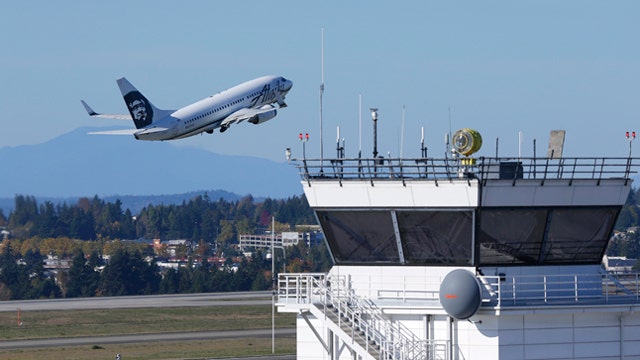FAA easing restrictions on electronics usage on flights
Doug McKelway reports from Washington, D.C.
WASHINGTON – Government safety rules are changing to let airline passengers use most electronic devices from gate-to-gate -- although you'll still have to stow your stuff during take-off and landing.
Passengers will eventually be able to read e-books, play games, and watch videos on their devices during all phases of flight, with very limited exceptions, the Federal Aviation Administration said Thursday morning.
[sidebar]
And everyone must put their gizmos down during the safety briefing and listen up, for heaven's sake.
For anyone who's longingly looked at that laptop during a 5-hour cross-country flight, the news will come as a delight, despite several caveats and restrictions. Electronic items, books and magazines, must be held or put in the seat-back pocket during the actual take-off and landing, for example. And cell phones should be in airplane mode or with cellular service disabled -- meaning no signal bars displayed.
Passengers still won't be allowed to use cell phones for voice communications: FCC regulations will still prohibit any airborne calls using them. But Candy Crush? Go for it.
If your air carrier provides Wi-Fi service during flight, you may use those services. You can also continue to use short-range Bluetooth accessories, like wireless keyboards, the FAA said.
“I commend the dedication and excellent work of all the experts who spent the past year working together to give us a solid report so we can now move forward with a safety-based decision on when passengers can use [portable electronic devices] on airplanes,” said FAA Administrator Michael Huerta.
[pullquote]
A4A, an aviation industry trade group, applauded the decision.
"A4A commends the Portable Electronic Devices (PED) Aviation Rulemaking Committee (ARC) for its report and recommendations on expanded use of personal electronic devices inflight. A4A and our members will work with the FAA to ensure expanded customer use of electronic devices is implemented safely and expeditiously."
Most new airliners are expected to meet the criteria, but changes won't happen immediately. Timing will depend upon the airline.
Connections to the Internet to surf, exchange emails, text or download data will still be prohibited below 10,000 feet. Heavier devices like laptops will have to be stowed.
A travel industry group welcomed the changes, calling them common-sense accommodations for a traveling public now bristling with technology. "We're pleased the FAA recognizes that an enjoyable passenger experience is not incompatible with safety and security," said Roger Dow, CEO of the U.S. Travel Association.
The Associated Press contributed to this report.





















